- Home
- Suzanne Collins
The Hunger Games Trilogy Page 86
The Hunger Games Trilogy Read online
Page 86
On the next block, we encounter more terrified refugees, but few soldiers. Just when it seems we might have caught a break, there’s a cracking sound, like an egg hitting the side of a bowl but magnified a thousand times. We stop, look around for the pod. There’s nothing. Then I feel the tips of my boots beginning to tilt ever so slightly. “Run!” I cry to Gale. There’s no time to explain, but in a few seconds the nature of the pod becomes clear to everyone. A seam has opened up down the center of the block. The two sides of the tiled street are folding down like flaps, slowly emptying the people into whatever lies beneath.
I’m torn between making a beeline for the next intersection and trying to get to the doors that line the street and break my way into a building. As a result, I end up moving at a slight diagonal. As the flap continues to drop, I find my feet scrambling, harder and harder, to find purchase on the slippery tiles. It’s like running along the side of an icy hill that gets steeper at every step. Both of my destinations—the intersection and the buildings—are a few feet away when I feel the flap going. There’s nothing to do but use my last seconds of connection to the tiles to push off for the intersection. As my hands latch on to the side, I realize the flaps have swung straight down. My feet dangle in the air, no foothold anywhere. From fifty feet below, a vile stench hits my nose, like rotted corpses in the summer heat. Black forms crawl around in the shadows, silencing whoever survives the fall.
A strangled cry comes from my throat. No one is coming to help me. I’m losing my grip on the icy ledge, when I see I’m only about six feet from the corner of the pod. I inch my hands along the ledge, trying to block out the terrifying sounds from below. When my hands straddle the corner, I swing my right boot up over the side. It catches on something and I painstakingly drag myself up to street level. Panting, trembling, I crawl out and wrap my arm around a lamppost for an anchor, although the ground’s perfectly flat.
“Gale?” I call into the abyss, heedless of being recognized. “Gale?”
“Over here!” I look in bewilderment to my left. The flap held up everything to the very base of the buildings. A dozen or so people made it that far and now hang from whatever provides a handhold. Doorknobs, knockers, mail slots. Three doors down from me, Gale clings to the decorative iron grating around an apartment door. He could easily get inside if it was open. But despite repeated kicks to the door, no one comes to his aid.
“Cover yourself!” I lift my gun. He turns away and I drill the lock until the door flies inward. Gale swings into the doorway, landing in a heap on the floor. For a moment, I experience the elation of his rescue. Then the white-gloved hands clamp down on him.
Gale meets my eyes, mouths something at me I can’t make out. I don’t know what to do. I can’t leave him, but I can’t reach him either. His lips move again. I shake my head to indicate my confusion. At any minute, they’ll realize who they’ve captured. The Peacekeepers are hauling him inside now. “Go!” I hear him yell.
I turn and run away from the pod. All alone now. Gale a prisoner. Cressida and Pollux could be dead ten times over. And Peeta? I haven’t laid eyes on him since we left Tigris’s. I hold on to the idea that he may have gone back. Felt an attack coming and retreated to the cellar while he still had control. Realized there was no need for a diversion when the Capitol has provided so many. No need to be bait and have to take the nightlock—the nightlock! Gale doesn’t have any. And as for all that talk of detonating his arrows by hand, he’ll never get the chance. The first thing the Peacekeepers will do is to strip him of his weapons.
I fall into a doorway, tears stinging my eyes. Shoot me. That’s what he was mouthing. I was supposed to shoot him! That was my job. That was our unspoken promise, all of us, to one another. And I didn’t do it and now the Capitol will kill him or torture him or hijack him or—the cracks begin opening inside me, threatening to break me into pieces. I have only one hope. That the Capitol falls, lays down its arms, and gives up its prisoners before they hurt Gale. But I can’t see that happening while Snow’s alive.
A pair of Peacekeepers runs by, barely glancing at the whimpering Capitol girl huddled in a doorway. I choke down my tears, wipe the existing ones off my face before they can freeze, and pull myself back together. Okay, I’m still an anonymous refugee. Or did the Peacekeepers who caught Gale get a glimpse of me as I fled? I remove my cloak and turn it inside out, letting the black lining show instead of the red exterior. Arrange the hood so it conceals my face. Grasping my gun close to my chest, I survey the block. There’s only a handful of dazed-looking stragglers. I trail close behind a pair of old men who take no notice of me. No one will expect me to be with old men. When we reach the end of the next intersection, they stop and I almost bump into them. It’s the City Circle. Across the wide expanse ringed by grand buildings sits the president’s mansion.
The Circle’s full of people milling around, wailing, or just sitting and letting the snow pile up around them. I fit right in. I begin to weave my way across to the mansion, tripping over abandoned treasures and snow-frosted limbs. About halfway there, I become aware of the concrete barricade. It’s about four feet high and extends in a large rectangle in front of the mansion. You would think it would be empty, but it’s packed with refugees. Maybe this is the group that’s been chosen to be sheltered at the mansion? But as I draw closer, I notice something else. Everyone inside the barricade is a child. Toddlers to teenagers. Scared and frostbitten. Huddled in groups or rocking numbly on the ground. They aren’t being led into the mansion. They’re penned in, guarded on all sides by Peacekeepers. I know immediately it’s not for their protection. If the Capitol wanted to safeguard them, they’d be down in a bunker somewhere. This is for Snow’s protection. The children form his human shield.
There’s a commotion and the crowd surges to the left. I’m caught up by larger bodies, borne sideways, carried off course. I hear shouts of “The rebels! The rebels!” and know they must’ve broken through. The momentum slams me into a flagpole and I cling to it. Using the rope that hangs from the top, I pull myself up out of the crush of bodies. Yes, I can see the rebel army pouring into the Circle, driving the refugees back onto the avenues. I scan the area for the pods that will surely be detonating. But that doesn’t happen. This is what happens:
A hovercraft marked with the Capitol’s seal materializes directly over the barricaded children. Scores of silver parachutes rain down on them. Even in this chaos, the children know what silver parachutes contain. Food. Medicine. Gifts. They eagerly scoop them up, frozen fingers struggling with the strings. The hovercraft vanishes, five seconds pass, and then about twenty parachutes simultaneously explode.
A wail rises from the crowd. The snow’s red and littered with undersized body parts. Many of the children die immediately, but others lie in agony on the ground. Some stagger around mutely, staring at the remaining silver parachutes in their hands, as if they still might have something precious inside. I can tell the Peacekeepers didn’t know this was coming by the way they are yanking away the barricades, making a path to the children. Another flock of white uniforms sweeps into the opening. But these aren’t Peacekeepers. They’re medics. Rebel medics. I’d know the uniforms anywhere. They swarm in among the children, wielding medical kits.
First I get a glimpse of the blond braid down her back. Then, as she yanks off her coat to cover a wailing child, I notice the duck tail formed by her untucked shirt. I have the same reaction I did the day Effie Trinket called her name at the reaping. At least, I must go limp, because I find myself at the base of the flagpole, unable to account for the last few seconds. Then I am pushing through the crowd, just as I did before. Trying to shout her name above the roar. I’m almost there, almost to the barricade, when I think she hears me. Because for just a moment, she catches sight of me, her lips form my name.
And that’s when the rest of the parachutes go off.
25
Real or not real? I am on fire. The balls of flame that erupted from the parachutes
shot over the barricades, through the snowy air, and landed in the crowd. I was just turning away when one caught me, ran its tongue up the back of my body, and transformed me into something new. A creature as unquenchable as the sun.
A fire mutt knows only a single sensation: agony. No sight, no sound, no feeling except the unrelenting burning of flesh. Perhaps there are periods of unconsciousness, but what can it matter if I can’t find refuge in them? I am Cinna’s bird, ignited, flying frantically to escape something inescapable. The feathers of flame that grow from my body. Beating my wings only fans the blaze. I consume myself, but to no end.
Finally, my wings begin to falter, I lose height, and gravity pulls me into a foamy sea the color of Finnick’s eyes. I float on my back, which continues to burn beneath the water, but the agony quiets to pain. When I am adrift and unable to navigate, that’s when they come. The dead.
The ones I loved fly as birds in the open sky above me. Soaring, weaving, calling to me to join them. I want so badly to follow them, but the seawater saturates my wings, making it impossible to lift them. The ones I hated have taken to the water, horrible scaled things that tear my salty flesh with needle teeth. Biting again and again. Dragging me beneath the surface.
The small white bird tinged in pink dives down, buries her claws in my chest, and tries to keep me afloat. “No, Katniss! No! You can’t go!”
But the ones I hated are winning, and if she clings to me, she’ll be lost as well. “Prim, let go!” And finally she does.
Deep in the water, I’m deserted by all. There’s only the sound of my breathing, the enormous effort it takes to draw the water in, push it out of my lungs. I want to stop, I try to hold my breath, but the sea forces its way in and out against my will. “Let me die. Let me follow the others,” I beg whatever holds me here. There’s no response.
Trapped for days, years, centuries maybe. Dead, but not allowed to die. Alive, but as good as dead. So alone that anyone, anything no matter how loathsome would be welcome. But when I finally have a visitor, it’s sweet. Morphling. Coursing through my veins, easing the pain, lightening my body so that it rises back toward the air and rests again on the foam.
Foam. I really am floating on foam. I can feel it beneath the tips of my fingers, cradling parts of my naked body. There’s much pain but there’s also something like reality. The sandpaper of my throat. The smell of burn medicine from the first arena. The sound of my mother’s voice. These things frighten me, and I try to return to the deep to make sense of them. But there’s no going back. Gradually, I’m forced to accept who I am. A badly burned girl with no wings. With no fire. And no sister.
In the dazzling white Capitol hospital, the doctors work their magic on me. Draping my rawness in new sheets of skin. Coaxing the cells into thinking they are my own. Manipulating my body parts, bending and stretching the limbs to assure a good fit. I hear over and over again how lucky I am. My eyes were spared. Most of my face was spared. My lungs are responding to treatment. I will be as good as new.
When my tender skin has toughened enough to withstand the pressure of sheets, more visitors arrive. The morphling opens the door to the dead and alive alike. Haymitch, yellow and unsmiling. Cinna, stitching a new wedding dress. Delly, prattling on about the niceness of people. My father sings all four stanzas of “The Hanging Tree” and reminds me that my mother—who sleeps in a chair between shifts—isn’t to know about it.
One day I awake to expectations and know I will not be allowed to live in my dreamland. I must take food by mouth. Move my own muscles. Make my way to the bathroom. A brief appearance by President Coin clinches it.
“Don’t worry,” she says. “I’ve saved him for you.”
The doctors’ puzzlement grows over why I’m unable to speak. Many tests are done, and while there’s damage to my vocal cords, it doesn’t account for it. Finally, Dr. Aurelius, a head doctor, comes up with the theory that I’ve become a mental, rather than physical, Avox. That my silence has been brought on by emotional trauma. Although he’s presented with a hundred proposed remedies, he tells them to leave me alone. So I don’t ask about anyone or anything, but people bring me a steady stream of information. On the war: The Capitol fell the day the parachutes went off, President Coin leads Panem now, and troops have been sent out to put down the small remaining pockets of Capitol resistance. On President Snow: He’s being held prisoner, awaiting trial and most certain execution. On my assassination team: Cressida and Pollux have been sent out into the districts to cover the wreckage of the war. Gale, who took two bullets in an escape attempt, is mopping up Peacekeepers in 2. Peeta’s still in the burn unit. He made it to the City Circle after all. On my family: My mother buries her grief in her work.
Having no work, grief buries me. All that keeps me going is Coin’s promise. That I can kill Snow. And when that’s done, nothing will be left.
Eventually, I’m released from the hospital and given a room in the president’s mansion to share with my mother. She’s almost never there, taking her meals and sleeping at work. It falls to Haymitch to check on me, make sure I’m eating and using my medicines. It’s not an easy job. I take to my old habits from District 13. Wandering unauthorized through the mansion. Into bedrooms and offices, ballrooms and baths. Seeking strange little hiding spaces. A closet of furs. A cabinet in the library. A long-forgotten bathtub in a room of discarded furniture. My places are dim and quiet and impossible to find. I curl up, make myself smaller, try to disappear entirely. Wrapped in silence, I slide my bracelet that reads mentally disoriented around and around my wrist.
My name is Katniss Everdeen. I am seventeen years old. My home is District 12. There is no District 12. I am the Mockingjay. I brought down the Capitol. President Snow hates me. He killed my sister. Now I will kill him. And then the Hunger Games will be over….
Periodically, I find myself back in my room, unsure whether I was driven by a need for morphling or if Haymitch ferreted me out. I eat the food, take the medicine, and am required to bathe. It’s not the water I mind, but the mirror that reflects my naked fire-mutt body. The skin grafts still retain a newborn-baby pinkness. The skin deemed damaged but salvageable looks red, hot, and melted in places. Patches of my former self gleam white and pale. I’m like a bizarre patchwork quilt of skin. Parts of my hair were singed off completely; the rest has been chopped off at odd lengths. Katniss Everdeen, the girl who was on fire. I wouldn’t much care except the sight of my body brings back the memory of the pain. And why I was in pain. And what happened just before the pain started. And how I watched my little sister become a human torch.
Closing my eyes doesn’t help. Fire burns brighter in the darkness.
Dr. Aurelius shows up sometimes. I like him because he doesn’t say stupid things like how I’m totally safe, or that he knows I can’t see it but I’ll be happy again one day, or even that things will be better in Panem now. He just asks if I feel like talking, and when I don’t answer, he falls asleep in his chair. In fact, I think his visits are largely motivated by his need for a nap. The arrangement works for both of us.
The time draws near, although I could not give you exact hours and minutes. President Snow has been tried and found guilty, sentenced to execution. Haymitch tells me, I hear talk of it as I drift past the guards in the hallways. My Mockingjay suit arrives in my room. Also my bow, looking no worse for wear, but no sheath of arrows. Either because they were damaged or more likely because I shouldn’t have weapons. I vaguely wonder if I should be preparing for the event in some way, but nothing comes to mind.
Late one afternoon, after a long period in a cushioned window seat behind a painted screen, I emerge and turn left instead of right. I find myself in a strange part of the mansion, and immediately lose my bearings. Unlike the area where I’m quartered, there seems to be no one around to ask. I like it, though. Wish I’d found it sooner. It’s so quiet, with the thick carpets and heavy tapestries soaking up the sound. Softly lit. Muted colors. Peaceful. Until I smell the roses. I
dive behind some curtains, shaking too hard to run, while I await the mutts. Finally, I realize there are no mutts coming. So, what do I smell? Real roses? Could it be that I am near the garden where the evil things grow?
As I creep down the hall, the odor becomes overpowering. Perhaps not as strong as the actual mutts, but purer, because it’s not competing with sewage and explosives. I turn a corner and find myself staring at two surprised guards. Not Peacekeepers, of course. There are no more Peacekeepers. But not the trim, gray-uniformed soldiers from 13 either. These two, a man and a woman, wear the tattered, thrown-together clothes of actual rebels. Still bandaged and gaunt, they are now keeping watch over the doorway to the roses. When I move to enter, their guns form an X in front of me.
“You can’t go in, miss,” says the man.
“Soldier,” the woman corrects him. “You can’t go in, Soldier Everdeen. President’s orders.”
I just stand there patiently waiting for them to lower their guns, for them to understand, without my telling them, that behind those doors is something I need. Just a rose. A single bloom. To place in Snow’s lapel before I shoot him. My presence seems to worry the guards. They’re discussing calling Haymitch, when a woman speaks up behind me. “Let her go in.”
I know the voice but can’t immediately place it. Not Seam, not 13, definitely not Capitol. I turn my head and find myself face-to-face with Paylor, the commander from 8. She looks even more beat up than she did at the hospital, but who doesn’t?
“On my authority,” says Paylor. “She has a right to anything behind that door.” These are her soldiers, not Coin’s. They drop their weapons without question and let me pass.
At the end of a short hallway, I push apart the glass doors and step inside. By now the smell’s so strong that it begins to flatten out, as if there’s no more my nose can absorb. The damp, mild air feels good on my hot skin. And the roses are glorious. Row after row of sumptuous blooms, in lush pink, sunset orange, and even pale blue. I wander through the aisles of carefully pruned plants, looking but not touching, because I have learned the hard way how deadly these beauties can be. I know when I find it, crowning the top of a slender bush. A magnificent white bud just beginning to open. I pull my left sleeve over my hand so that my skin won’t actually have to touch it, take up a pair of pruning shears, and have just positioned them on the stem when he speaks.

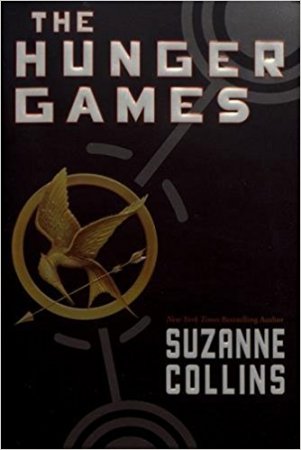 The Hunger Games
The Hunger Games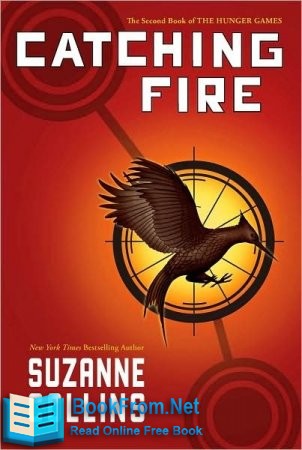 Catching Fire
Catching Fire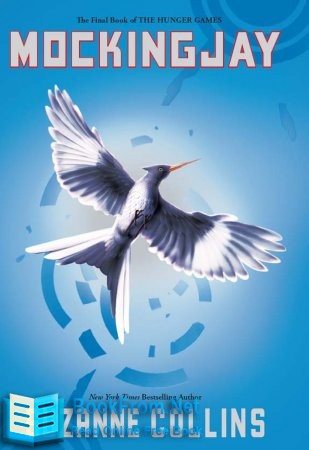 Mockingjay
Mockingjay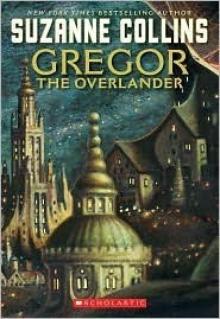 Gregor the Overlander
Gregor the Overlander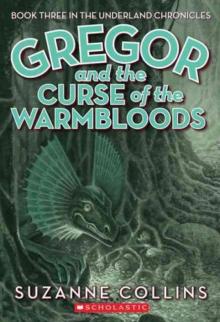 Gregor and the Curse of the Warmbloods
Gregor and the Curse of the Warmbloods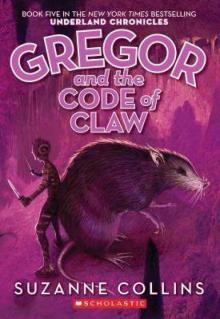 Gregor and the Code of Claw
Gregor and the Code of Claw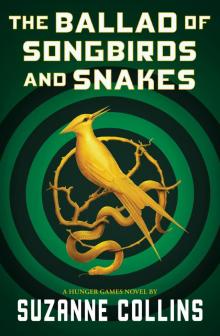 The Ballad of Songbirds and Snakes
The Ballad of Songbirds and Snakes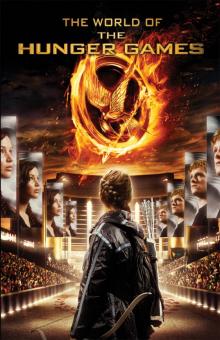 The World of the Hunger Games
The World of the Hunger Games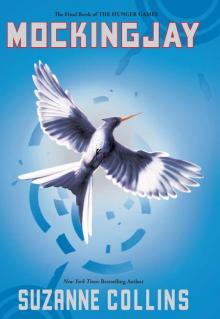 Mockingjay (The Final Book of The Hunger Games)
Mockingjay (The Final Book of The Hunger Games)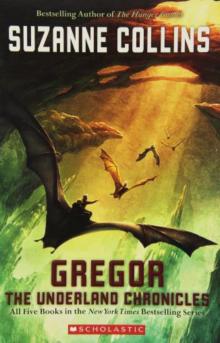 The Underland Chronicles: Books 1-5 Paperback Box Set
The Underland Chronicles: Books 1-5 Paperback Box Set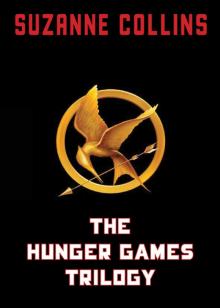 The Hunger Games Trilogy
The Hunger Games Trilogy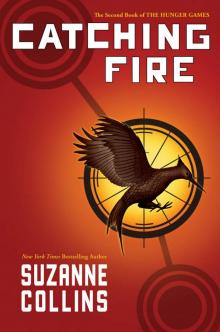 Hunger Games 02 - Catching Fire
Hunger Games 02 - Catching Fire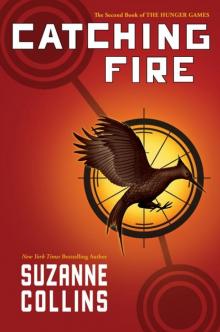 Cathing Fire thg-2
Cathing Fire thg-2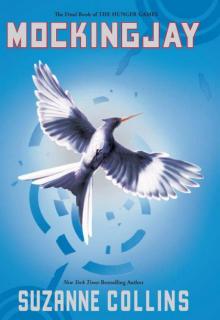 Hunger Games 03-Mockingjay
Hunger Games 03-Mockingjay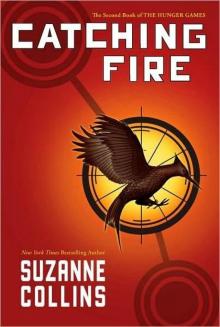 Hunger Games 2 - Catching Fire
Hunger Games 2 - Catching Fire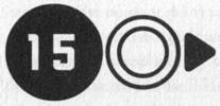 Hunger Games 01 - The Hunger Games
Hunger Games 01 - The Hunger Games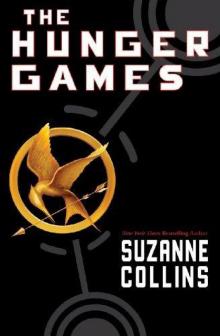 Hunger Games 01-The Hunger Games
Hunger Games 01-The Hunger Games